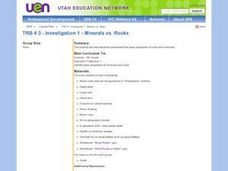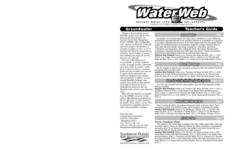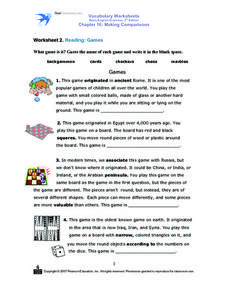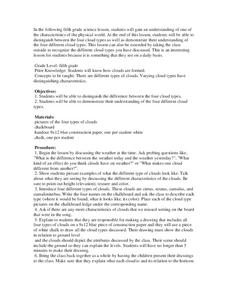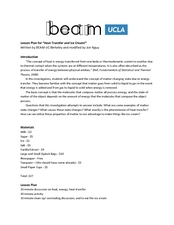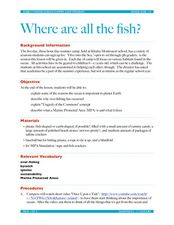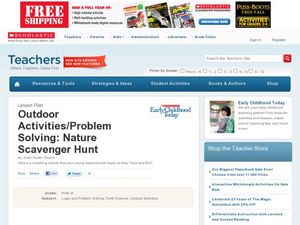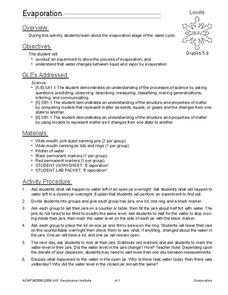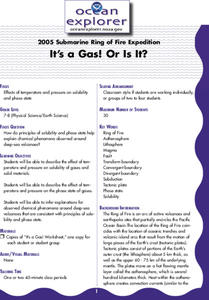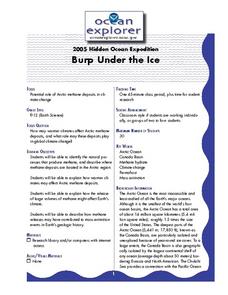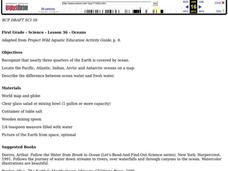Curated OER
How Do You Dew?
Students examine how the processes of condensation and evaporation occur. They describe the relationship between heat energy, evaporation and condensation of water on Earth. They give examples of the processes of evaporation and...
Curated OER
Minerals vs. Rocks
Fourth graders are introduced to the characteristics of a variety of minerals and rocks. As a class, they are shown rocks and minerals and asked to describe them as a geologist would. They work together to measure and record their...
Curated OER
WaterWeb 2
In this water worksheet, students answer 10 questions about Florida's water. Students also describe the role of ground water and sinkholes.
Curated OER
Reading: Games
In this games worksheet, students read the names of 5 common games. Students then read 5 paragraphs that describe the origin of a game. Students guess the name of each game and write it in the blank space.
Curated OER
Clouds
Students explore various cloud types. In this earth science lesson, students use pictures of the four types of clouds and identify them by name. Students construct pictures of clouds using chalk and blue paper.
Curated OER
Let's Create an Ecosystem
Seventh graders discover how an ecosystem works by creating one in class. In this Earth science lesson plan, 7th graders study vocabulary terms associated with ecosystem and read environment handouts. Students create an...
Curated OER
Weather Olympics
Students consider the effects of topography on climate patterns. In this earth science lesson, students research weather patterns and make inferences of how the land forms may create different climates. Students compare Celsius...
Curated OER
"Heat Transfer and Ice Cream!"
Students analyze earth science by creating a frozen treat in class. In this heat transfer lesson, students discuss how matter is transformed from solid to liquid and liquid to gas when energy is removed from the equation. Students...
Curated OER
Build an Ice Cap
Students research Earth science by conducting an experiment in class. For this ice-cap lesson, students identify what an ice cap is and create a biome using a box which measures 1 ft. x 1 ft. Students participate in an animal...
Curated OER
The Global Precipitation Measurement Mission (GPM) Lesson
Introduce your class to one of the ways that technology is benefiting humanity. The Global Precipitation Measurement Mission involves the data collected by nine satellites from different countries with a united focus on studying world...
Curated OER
Cracked Marbles
Fourth graders determine how weathering, specifically ice, snow, and freezing water change the Earth's surface and rocks. After completing the investigations, they explain how heating and cooling expand and contract marbles until cracks...
Curated OER
Nazis Flying Saucers – Film Sparks UFO Debate
Students explore the aircraft used in World War II. In this World History lesson, students read an article that describes a "flying saucer" created by the Nazi's. Upon completion of the reading, students answer questions on the article,...
Science Matters
Wave Watching
Seismologists use the direction and arrival times of p waves and s waves to determine the distance to the source of an earthquake. The engaging lesson has students line up to form human waves. Through different movements when attached,...
Curated OER
Where Are All the Fish?
Students identify the problems that marine life is facing today. In this marine science lesson, students explain how Marine Protected Areas can help the ocean and the fish. They brainstorm ways to help in the conservation effort.
Curated OER
Social Studies: Cooking Methods - Past and Present
Fourth graders identify geographic regions (Texas' Edwards Plateau) and sequence steps in the hot rock cooking process. They compare and contrast prehistoric and contemporary cooking methods. Students conduct online research and record...
Curated OER
Outdoor Activities/Problem Solving: Nature Scavenger Hunt
Students act as young explorers on this scavenger hunt. In this early childhood lesson plan, students build problem-solving and visual discrimination skills as they search outdoors to find matching nature items.
Curated OER
Evaporation
Students study the evaporation stage of the water cycle. In this water cycle lesson, students participate in an experiment to study the process of evaporation that uses jars and water. Students complete an observation worksheet for...
Curated OER
It's a Gas! Or is it?
Pupils discover the principles of solubility and phase state and their influence on chemical phenomena observed around deep-sea volcanoes. They describe the effect of temperature and pressure on solubility of gasses and solid materials.
Curated OER
Burp Under the Ice
Students examine the impact of climate warming on Arctic methane deposits. They identify natural methane processes and describe how this contributes to species extinction. They write reports on their findings.
Curated OER
When is Dinner Served? Predicting the Spring Phytoplankton Bloom in the Gulf of Maine (College Level)
Students are able to explain the ecological importance of phytoplankton. They describe the components that influence a phytoplankton bloom. Students interpret satellite images in order to correlate buoy data.
Curated OER
Make it Rain!
Students describe how water exists on earth in three states. They trace the path that rain water follows after it falls. Students describe various forms that water takes on the earth's surface and conditions under which they exist....
Curated OER
Let's Have a Lesson Within a Lesson
Learners role-play the role of a student who does not comprehend the language the lesson is being instructed in. Using the internet, they research the characteristics, distribution and migration of human populations over time. In groups,...
Curated OER
Oceans
First graders recognize that nearly three quarters of the Earth is covered by ocean. They locate the Pacific, Atlantic, Indian, Arctic and Antarctic oceans on a map. They describe the difference between ocean water and fresh water.
Curated OER
As the World Turns
Third graders read books and participate in class discussions about the motion of the stars and planets and moons in relation to the Earth. In small groups, 3rd graders act out these movements to music.



